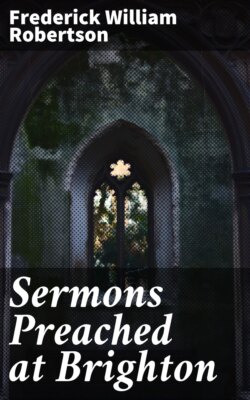Читать книгу Sermons Preached at Brighton - Frederick William Robertson - Страница 7
На сайте Литреса книга снята с продажи.
1. The tyranny of the present.
Оглавление“Christ,” says the Apostle Paul, “hath redeemed us from this present evil world;” and again, “Demas hath forsaken me, having loved this, present world.”
Let a stress be laid on the word present. Worldliness is the attractive power of something present, in opposition to something to come. It is this rule and tyranny of the present that constitutes Demas a worldly man.
In this respect, worldliness is the spirit of childhood carried on into manhood. The child lives in the present hour—to-day to him is everything. The holiday promised at a distant interval is no holiday at all—it must be either now or never. Natural in the child, and therefore pardonable, this spirit, when carried on into manhood, is coarse—is worldliness. The most distinct illustration given us of this, is the case of Esau. Esau came from the hunting-field worn and hungry; the only means of procuring the tempting mess of his brother's pottage was the sacrifice of his father's blessing, which in those ages carried with it a substantial advantage; but that birthright could be enjoyed only after years—the pottage was present, near, and certain; therefore he sacrificed a future and higher blessing, for a present and lower pleasure. For this reason Esau is the Bible type of worldliness: he is called in Scripture a profane, that is, not a distinctly vicious, but a secular or worldly person—an overgrown child; impetuous, inconsistent, not without gleams of generosity and kindliness, but ever accustomed to immediate gratification.
In this worldliness, moreover, is to be remarked the gamester's desperate play. There is a gambling spirit in human nature. Esau distinctly expresses this: “Behold I am at the point to die, and what shall my birthright profit me?” He might never live to enjoy his birthright; but the pottage was before him, present, certain, there.
Now, observe the utter powerlessness of mere preaching to cope with this tyrannical power of the present. Forty thousand pulpits throughout the land this day, will declaim against the vanity of riches, the uncertainty of life, the sin of worldliness—against the gambling spirit of human nature; I ask what impression will be produced by those forty thousand harangues? In every congregation it is reducible to a certainty that, before a year has passed, some will be numbered with the dead. Every man knows this, but he thinks the chances are that it will not be himself; he feels it a solemn thing for Humanity generally—but for himself there is more than a chance. Upon this chance he plays away life.
It is so with the child: you tell him of the consequences of to-day's idleness—but the sun is shining brightly, and he cannot sacrifice to-day's pleasure, although he knows the disgrace it will bring to-morrow. So it is with the intemperate man: he says—“Sufficient unto the day is the evil, and the good thereof; let me have my portion now.” So that one great secret of the world's victory lies in the mighty power of saying “Now.”
